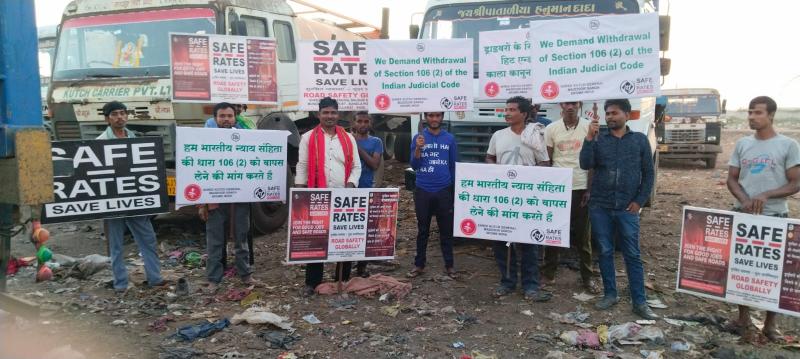In September 2019 the tripartite constituents of the International Labour Organisation (ILO) adopted Guidelines on the promotion of decent work and road safety in the transport sector. The Guidelines contain a wide range of recommendations on best practices for protecting the rights of commercial vehicle (CMV) drivers (including gig workers) and protecting health and safety. Their adoption was the product of several years of effort by the ITF and its affiliates in the road transport sector.
We have now begun a new phase of our work, in which we are actively seeking to implement the Guidelines. The ITF has developed a Brief for Trade Unions explaining the main content and significance of the Guidelines. The Brief provides an overview of the main content of the Guidelines, focusing on the responsibilities they lay out for economic employers and the way governments can regulate to enforce economic employer accountability. It works together with the related strategy document, Worker Power in Supply Chains: The ITF Economic Employer Strategy, to show how the Guidelines can be a powerful tool for building workers’ power.
The ITF is also holding trainings to assist affiliates in understanding the Guidelines and developing demands and campaign strategies.
Affiliates interested in hosting a training should contact: inlandtransport@itf.org.uk
Significance and Content of the Guidelines
The Guidelines are particularly significant for two reasons. First, they make an explicit connection between road safety and cost-cutting pressures, low rates of pay and other ‘decent work deficits’. Second, they are the first tripartite-agreed text adopted by the ILO that recognises the responsibilities of not only governments, employers and unions, but also ‘road transport chain parties’ and in particular, ‘transport buyers’ or ‘economic employers’ – in other words, the companies at the top of road transport contracting chains. Importantly, the Guidelines apply to all CMV drivers (including gig workers) regardless of their employment status and contain several recommendations specifically on protecting the rights of non-wage-earning or self-employed and informal CMV drivers.
The Guidelines summarise existing ILO standards on decent work in the road transport industry and also include several innovative recommendations, including on:
- Sustainable Payments - A system for establishing rates of pay for wage-earning and non-wage-earning CMV drivers which guarantees safety and fairness, based on the Safe Rates Model;
- Monitoring and enforcement based on chain of responsibility principles and due diligence obligations, which hold economic employers accountable and recognise the potential role of trade unions;
- Transparent contracting, in particular through Safe Driving Plans, which lay out the conditions needed to keep drivers safe and the responsibilities of economic employers;
- Government, employer and economic employer responsibilities to prevent violence and harassment, provide adequate sanitation facilities and address gender-based occupational segregation and discrimination;
- Specific means for protecting the fundamental labour rights of non-wage-earning CMV drivers, informal workers and other workers in non-standard forms of employment.
A more detailed explanation of the scope, significance and main content of the Guidelines can be found in the Brief.




